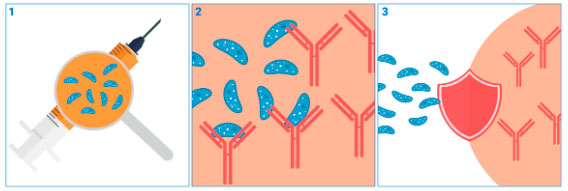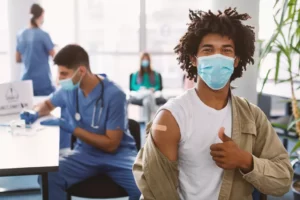Humanity has made great advances in medicine that have allowed us to improve our quality of life and avoid diseases that have affected us for centuries. One of the advances that have helped us be healthier are vaccines. These are so incredible that they have completely eradicated diseases such as smallpox and rinderpest. And as if the positive impact on our health were not impressive enough, vaccines have also had positive economic and societal effects. Keep reading to discover the benefits of vaccines.
How Do Vaccines Work?
First, let’s look at what exactly vaccines are. Infections occur when a pathogen (a harmful organism such as a virus or bacteria) enters the body. The body’s natural response is to attack this pathogen to prevent it from multiplying and to stop the infection. This process is done by the immune system through white blood cells. However, the body may be slow to respond or may not have the necessary tools to stop the harmful organism if it is the first time it enters the body.
This is where vaccines come into play. They are carefully designed to mimic an infection. Vaccines are composed of a weakened or inactivated organism or even a blueprint of the pathogen. The vaccine produces an immune response upon entering the body to teach it how to fight the infection it is imitating. This way, the body prepares itself for when it encounters the actual harmful organism; without going through a prior infection process, it could otherwise result in serious symptoms or even death.
Public Health Benefits of Vaccines
One of the most obvious and important benefits of vaccines is the reduction and prevention of millions of morbidity and mortality cases, that is, illnesses and deaths. More than 3 million deaths are prevented every year thanks to vaccines. Today we have vaccines to prevent more than 20 life-threatening diseases such as diphtheria, pertussis, influenza, and tetanus.
Another amazing benefit is the elimination and eradication of diseases. A disease is said to be eliminated when it is successfully suppressed from a region. On the other hand, the disease is eradicated when it is eliminated from the entire world. An example of the first case is polio, which was declared as eliminated from the United States in 1979. As for total eradication, smallpox, a disease that killed 35% of those infected, was declared eradicated in 1980.
The effectiveness of vaccines as a preventive method is so powerful that if enough people are vaccinated, those who cannot receive a vaccine will also be at less risk of infection. Those who cannot be vaccinated due to age or medical reasons, such as people with weakened immune systems like cancer patients, will be protected from infection if herd immunity is achieved; this is usually when 50% to 90% of a given population has been immunized.
Children have been among the greatest beneficiaries of vaccines. Previously, thousands of children died from diseases that are now easily preventable. For example, eliminating polio has prevented thousands of deaths of children under 5 years of age. This infection used to kill thousands of children every summer and permanently paralyze 1 in 200 children who became infected.
Economic Benefits of Vaccines
There are also economic benefits to vaccines. Both families and government entities save millions of dollars each year by avoiding medical costs, lost wages, and lower productivity. A population with a strengthened immune system will be able to better develop economically and be more productive.
Societal Benefits of Vaccines
The entire community benefits from vaccination because when a population is healthier and stronger, health and social services are not under as much pressure and can better attend to other medical cases that cannot yet be prevented. In addition, thanks to vaccines, thousands of children will not have to interrupt their studies due to illnesses, therefore improving the quality of their education.
At DFW Family Clinic, we pay special attention to disease prevention. Here you will be able to receive vaccination services, including a pre-screening before any vaccines are administered to your child. This way you can be sure that they will not have any adverse reactions and that the process will be safe. Contact us if you have any questions about vaccines or if you’re ready to schedule an appointment so that you can better protect your family and your community.










